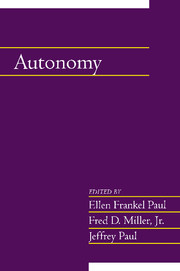Book contents
- Frontmatter
- Contents
- Introduction
- Acknowledgments
- Contributors
- Stoic Autonomy
- Autonomous Autonomy: Spinoza on Autonomy, Perfectionism, and Politics
- Kant on the Theory and Practice of Autonomy
- How Much Should We Value Autonomy?
- Autonomy, Duress, and Coercion
- Autonomy and Hierarchy
- Reason and Autonomy
- Identification, the Self, and Autonomy
- Some Tensions between Autonomy and Self-Governance
- Autonomy from the Viewpoint of Teleological Behaviorism
- The Paradox of Group Autonomy
- Abortion, Autonomy, and Control over One's Body
- Freedom as a Political Ideal
- Index
Introduction
Published online by Cambridge University Press: 06 July 2010
- Frontmatter
- Contents
- Introduction
- Acknowledgments
- Contributors
- Stoic Autonomy
- Autonomous Autonomy: Spinoza on Autonomy, Perfectionism, and Politics
- Kant on the Theory and Practice of Autonomy
- How Much Should We Value Autonomy?
- Autonomy, Duress, and Coercion
- Autonomy and Hierarchy
- Reason and Autonomy
- Identification, the Self, and Autonomy
- Some Tensions between Autonomy and Self-Governance
- Autonomy from the Viewpoint of Teleological Behaviorism
- The Paradox of Group Autonomy
- Abortion, Autonomy, and Control over One's Body
- Freedom as a Political Ideal
- Index
Summary
Autonomy is often recognized as a central value in moral and political philosophy. There are, however, fundamental disagreements over how autonomy should be understood, what its implications are for public policy, and even whether the concept itself is theoretically defensible.
Autonomy is generally understood as some form of self-regulation, self-governance, or self-direction. As some of the essays in this volume show, great philosophers of the past have shed valuable light on the subject of autonomy: including the ancient Stoics, modern philosophers such as Spinoza, and most importantly, Immanuel Kant. Theorists have disputed whether such a view can be reconciled with the most plausible accounts of human motivation. Some have tried to analyze autonomy in terms of the self being fueled by its higher-order desires, passions, or commitments. Others have argued that autonomy must be understood in terms of acting from reason or a sense of moral duty independent of the passions. Theorists have also questioned whether the ideal of autonomy presupposes a metaphysical theory of free will, or whether it is consistent with some version of determinism. The difficult question of whether the concept of autonomy can be reconciled with empirical scientific theories of human psychology is also a pressing concern.
The role of autonomy in moral and political theory is controversial too. Some theorists argue that human rights are essentially rights to autonomy, whereas others treat the right to welfare as fundamental and autonomy as derivative.
- Type
- Chapter
- Information
- Autonomy , pp. vii - xiiiPublisher: Cambridge University PressPrint publication year: 2003



